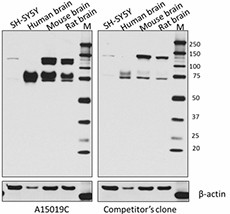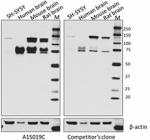- Clone
- A15019C (See other available formats)
- Regulatory Status
- RUO
- Other Names
- Neurotrophic tyrosine kinase receptor type 2, TrkB, GP145-TrkB
- Isotype
- Mouse IgG2a, κ
- Ave. Rating
- Submit a Review
- Product Citations
- publications

-

Total protein from SH-SY5Y cell lysates and human, mouse and rat brain lysates (15µg protein) were resolved by 4-12% Bis-tris gel electrophoresis, transferred to nitrocellulose, and probed with 1µg/mL purified anti-NTRK2 antibody (clone A15019C) ) or competitor’s antibody used at manufactures recommended concentration (upper). Proteins were visualized using a goat anti-mouse-IgG secondary antibody conjugated to HRP and chemiluminescence detection. Direct-Blot™ HRP anti-β-actin Antibody was used as a loading control (lower).
| Cat # | Size | Price | Quantity Check Availability | Save | ||
|---|---|---|---|---|---|---|
| 695102 | 100 µg | £189 | ||||
NTRK2 (Neurotrophic Tyrosine Kinase, Receptor, type 2), also known as TrkB (Tropomyosin related kinase B), is one of the members of the neurotrophin receptor family, which include TrkA and TrkC. All three Trk proteins exhibit a conserved subdomain that contains a signal peptide, two cysteine rich domains, a cluster of three leucine rich motifs, and two Ig-like domains in the extracellular portion. It has been shown that Trk receptor-mediated neurotrophic signaling regulates neuron physiology, cell proliferation and survival, axon and dendrite growth and patterning, and synaptic plasticity. The neurotrophins that activate NTRK2 are BDNF (Brain Derived Neurotrophic Factor), Neurotrophin-3 (NT-3), and Neurotrophin-4 (NT-4). BDNF is known to trigger NTRK2 dimerization and auto phosphorylation that leads to the activation of downstream signaling pathways. After the receptor-ligand binding, NTRK2-BDNF complex is internalized and transported from the nerve terminal to the cell body as signaling endosomes to mediate numerous signaling events. It has been demonstrated that activation of NTRK2 can lead to the down regulation of the main potassium-chloride cotransporter KCC2 in neurons, thereby increasing the intracellular Cl- concentration in lamina I neurons. Recently, it was shown that BDNF-NTRK2 signaling may play a role in the pathogenesis of post-traumatic stress disorders and mutations in the NTRK2 gene have been associated with obesity and mood disorders.
Product DetailsProduct Details
- Verified Reactivity
- Human, Mouse, Rat
- Antibody Type
- Monoclonal
- Host Species
- Mouse
- Immunogen
- Purified recombinant full length of human NTRK2
- Formulation
- Phosphate-buffered solution, pH 7.2, containing 0.09% sodium azide.
- Preparation
- The antibody was purified by affinity chromatography.
- Concentration
- 0.5 mg/ml
- Storage & Handling
- The antibody solution should be stored undiluted between 2°C and 8°C.
- Application
-
WB - Quality tested
- Recommended Usage
-
Optimal concentration of usage is 0.1 - 1 µg/mL for WB. The optimal concentration should be determined by titration for each individual assay of interest
- RRID
-
AB_2686965 (BioLegend Cat. No. 695102)
Antigen Details
- Structure
- Human NTRK2 has 7 isoforms, and predicted Mw ranges from 35 to 93kDa. It has 11 potential N-glycosylation sites.
- Distribution
-
NTRK2 is found primarily in the nervous system. It also can be found in the pancreas, skeletal muscles, and the kidney. A truncated form of TrkB (missing the tyrosine kinase domain) is found in heart, ovary, and the spleen.
- Function
- NTRK2, when binded to BDNF, NT-3, and NT-4, is able to exert neuron cells' biological functions such as proliferation, survival, axon, and dendrite growth.
- Interaction
- Interacts with SHC1, PLCG1 and/or PLCG2, SH2B1 and SH2B2, NGFR, SH2D1A, SQSTM1 and KIDINS220, FRS2.
- Ligand/Receptor
- BDNF, NT-3 and NT-4.
- Biology Area
- Cell Biology, Neuroscience, Synaptic Biology
- Molecular Family
- Soluble Receptors, Protein Kinases/Phosphatase
- Antigen References
-
1. Snider WD. 1994. Cell 77:627.
2. Grace PM, et al. 2014. Nat. Rev. Immunol. 14:217.
3. Neveu I and Arenas E. 1996. J. Cell Biol. 133:631.
4. Green CR, et al. 2013. J. Depress Anxiety S4:006.
5. Gupta VK, et al. 2013. Int. J. Mol. Sci. 14:10122.
6. Pla P, et al. 2014. Front Behav. Neurosci. 8:135.
7. Liu X, et al. 2014. J. Biol. Chem. 289:27571. - Gene ID
- 4915 View all products for this Gene ID
- UniProt
- View information about NTRK2 on UniProt.org
Related Pages & Pathways
Pages
Related FAQs
Other Formats
View All NTRK2 Reagents Request Custom Conjugation| Description | Clone | Applications |
|---|---|---|
| Purified anti-NTRK2 | A15019C | WB |
Compare Data Across All Formats
This data display is provided for general comparisons between formats.
Your actual data may vary due to variations in samples, target cells, instruments and their settings, staining conditions, and other factors.
If you need assistance with selecting the best format contact our expert technical support team.
-
Purified anti-NTRK2

Total protein from SH-SY5Y cell lysates and human, mouse and...
 Login / Register
Login / Register 







Follow Us